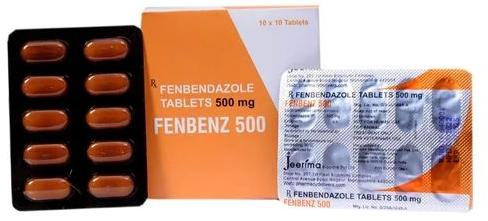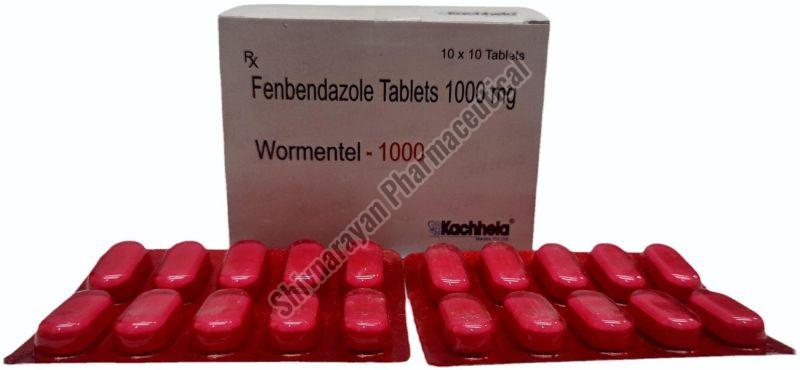Checking out the Systems Behind Fenbendazole and Its Effect On Pet Wellness
Fenbendazole is an extensively utilized anthelmintic known for its performance against different parasites. Its main device includes the restraint of microtubule development, which interferes with vital processes in these virus. Beyond its antiparasitic properties, fenbendazole likewise shows up to enhance immune actions and has anti-inflammatory advantages. Understanding these multifaceted impacts might expose new applications for animal health and wellness. Concerns stay regarding its full potential and safety profile.
The Pharmacokinetics of Fenbendazole
The pharmacokinetics of fenbendazole, a widely utilized anthelmintic in veterinary medicine, involves the research study of its absorption, circulation, metabolic rate, and excretion within animal systems. After administration, fenbendazole is quickly taken in from the stomach tract, with peak plasma focus happening within hours. Its distribution is influenced by factors such as tissue binding and lipid solubility, permitting it to pass through various tissues efficiently. The medication goes through extensive metabolism primarily in the liver, where it is exchanged energetic and non-active metabolites. These metabolites contribute in the drug's total efficiency and safety and security profile. Excretion occurs largely with feces, with a smaller percentage gotten rid of by means of urine. The half-life of fenbendazole varies among species, which influences application routines. Recognizing these pharmacokinetic homes is vital for enhancing its restorative usage and making certain efficient bloodsucker control in veterinary techniques.
Mechanisms of Action Against Parasites
Fenbendazole applies its antiparasitic impacts primarily through the inhibition of microtubule development in bloodsuckers. This disruption influences their structural integrity and cellular functions, leading to impaired basal metabolism. Because of this, the medication effectively compromises the survival and recreation of numerous parasitic microorganisms.
Inhibition of Microtubule Development
Inhibition of microtubule formation represents a vital device whereby particular anthelmintic representatives, consisting of fenbendazole, exert their effects on bloodsuckers. Fenbendazole binds to tubulin, a healthy protein that forms microtubules, interrupting the polymerization process required for microtubule assembly. This disturbance hinders essential cellular features, consisting of mitosis, intracellular transportation, and architectural integrity. As microtubules play a vital duty in maintaining the shape and function of parasitic cells, their inhibition brings about cell cycle arrest and ultimate fatality of the parasite. This system is particularly efficient versus nematodes, as their reliance on microtubules for wheelchair and nutrient absorption makes them prone to fenbendazole. The restraint of microtubule development is an important element of fenbendazole's therapeutic effectiveness in veterinary medicine.
Disruption of Power Metabolic Rate
Interrupting energy metabolic process is one more essential system through which fenbendazole targets parasitical organisms. This anthelmintic alters the energy manufacturing pathways within parasites, largely affecting their capability to produce adenosine triphosphate (ATP) By preventing sugar uptake and disrupting mitochondrial function, fenbendazole limits the power resources vital for the survival and reproduction of these organisms. Therefore, bloodsuckers end up being progressively at risk to ecological tensions and immune responses. The disturbance in power metabolism not just affects the parasites directly but likewise minimizes their capability to assimilate nutrients, even more impairing their growth - 222 mg. Overall, the interruption of basal metabolism represents an essential facet of fenbendazole's efficiency versus various parasitic infections, adding greatly to enhanced animal health outcomes
Potential Side Results and Safety Profile
The potential adverse effects and security account of fenbendazole warrant cautious consideration, specifically in vet applications. While typically related to as secure, some animals might experience damaging reactions, including stomach disturbances such as throwing up and diarrhea. In addition, neurological signs and symptoms, although unusual, have been reported in delicate people, highlighting the need for tracking throughout treatment.

Fenbendazole's safety and security in numerous species, consisting of canines and felines, has been recorded, however dosage and period of therapy need to be meticulously handled to lessen risks. Pregnant or breast feeding pets might likewise require special attention, as the impacts on establishing fetuses or nursing children are not completely comprehended.
Routine vet appointments can assist alleviate possible negative effects and assure the drug is carried out suitably. While fenbendazole is an efficient anthelmintic agent, watchfulness regarding its side results is necessary for keeping animal health and wellness.
Fenbendazole's Impact on Immune Function
Fenbendazole has actually been noted for its potential to regulate immune system feedbacks in pets. Its anti-inflammatory homes may add to improved immune function, offering a twin advantage in handling health and wellness (fenbendazole). Understanding these impacts is important for assessing fenbendazole's role in veterinary medication
Body Immune System Modulation

Anti-inflammatory Features
Anti-inflammatory effects represent a significant element of fenbendazole's influence on immune feature. Research study suggests that fenbendazole may reduce the manufacturing of pro-inflammatory cytokines, which are essential in moderating inflammatory actions. By regulating these cytokines, fenbendazole can possibly reduce inflammation-related problems in pets. This anti-inflammatory activity not just aids in taking care of symptoms connected with different diseases yet also boosts total immune system efficiency. In addition, its capacity to advertise a well balanced immune feedback assists stop extreme inflammatory damages, which can cause persistent wellness problems. Fenbendazole's function in inflammation management emphasizes its relevance in veterinary medicine, giving a double benefit of antiparasitic action and immune system support for pet health and wellness.
Applications Past Conventional Parasitic Infections
While mostly identified for its efficiency versus different parasitic infections, fenbendazole has actually amassed interest for possible applications yet traditional scope. Current research studies suggest that fenbendazole may have valuable results on cellular health and immune reaction, making it a fascinating candidate for managing other wellness problems in animals. For instance, its reported anti-inflammatory buildings may give alleviation for animals experiencing persistent inflammatory illness. In addition, some research shows that fenbendazole can contribute in supporting the total health of animals by boosting nutrition absorption and gastrointestinal health and wellness. Moreover, its prospective as a complement discover this info here treatment in cancer cells treatment has stimulated rate of interest, as preliminary findings recommend it may prevent growth cell growth in particular contexts. These varied applications highlight fenbendazole's adaptability, urging additional expedition right into its multifaceted advantages for pet health beyond its traditional usage as a deworming agent.
Future Study Instructions and Implications for Animal Wellness
The expedition of fenbendazole's prospective applications has opened brand-new opportunities for study targeted at improving animal wellness. blog here Future research studies might concentrate on its efficiency versus a more comprehensive variety of microorganisms, consisting of microorganisms and infections, consequently increasing its duty in veterinary medication. The implications of fenbendazole's mechanisms, such as its effect on immune inflection, warrant better investigation to understand exactly how it can bolster total health in various varieties.
Additionally, research study may discover suitable dosages and solutions to maximize efficiency while lessening potential negative effects. Checking out fenbendazole's collaborating results with various other medications could lead to much more reliable treatment methods. Longitudinal researches examining lasting outcomes in animals treated with fenbendazole can offer beneficial insights into its safety and security and performance. Generally, the ongoing exploration of fenbendazole provides encouraging capacity to boost animal wellness, necessitating a joint method amongst researchers, veterinarians, and pharmaceutical programmers to help with innovations around.
Regularly Asked Inquiries
Can Fenbendazole Be Used in Animals for Bloodsucker Prevention?
The inquiry of whether fenbendazole can be utilized in animals for parasite avoidance matters, as manufacturers look for efficient therapies (fenbendazole 222). Study indicates it might give benefits, yet proper guidelines and vet advice are necessary for secure use
What Is the Recommended Dosage of Fenbendazole for Various Animals?

Exist Any Type Of Understood Medication Interactions With Fenbendazole?
Present understanding indicates that fenbendazole may communicate with specific medications, potentially other impacting their efficacy or metabolism. Veterinary specialists advise seeking advice from a vet to examine private animal instances and establish any kind of possible communications before management.
Exactly How Does Fenbendazole Compare to Various Other Antiparasitic Drugs?
Fenbendazole is often contrasted to various other antiparasitic medicines based on efficiency, range of activity, and safety and security profiles. It is favored for its effectiveness versus a large range of bloodsuckers while usually displaying very little side impacts in pets.
Is Fenbendazole Effective Versus Viral or Bacterial Infections in Animals?
The performance of fenbendazole versus viral or bacterial infections in pets stays unproven. Research mainly concentrates on its antiparasitic properties, with limited proof supporting any kind of role in treating non-parasitic infections in vet medication.